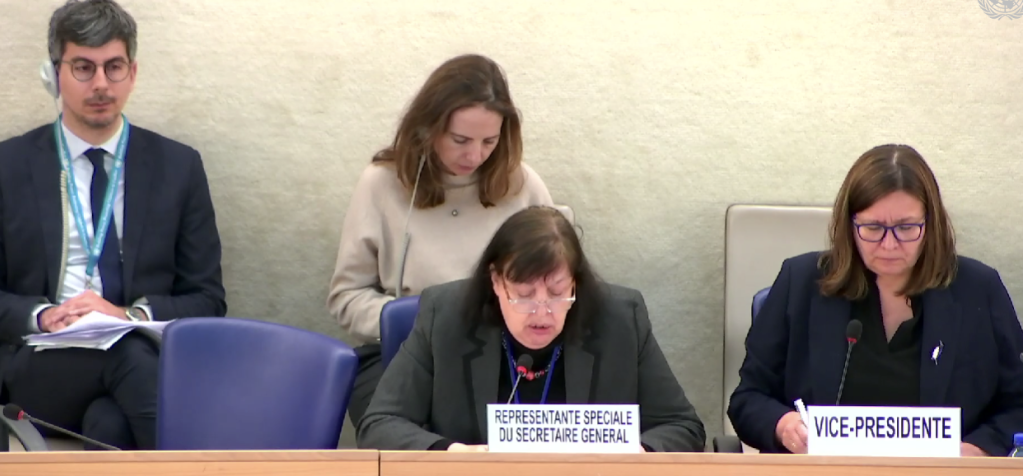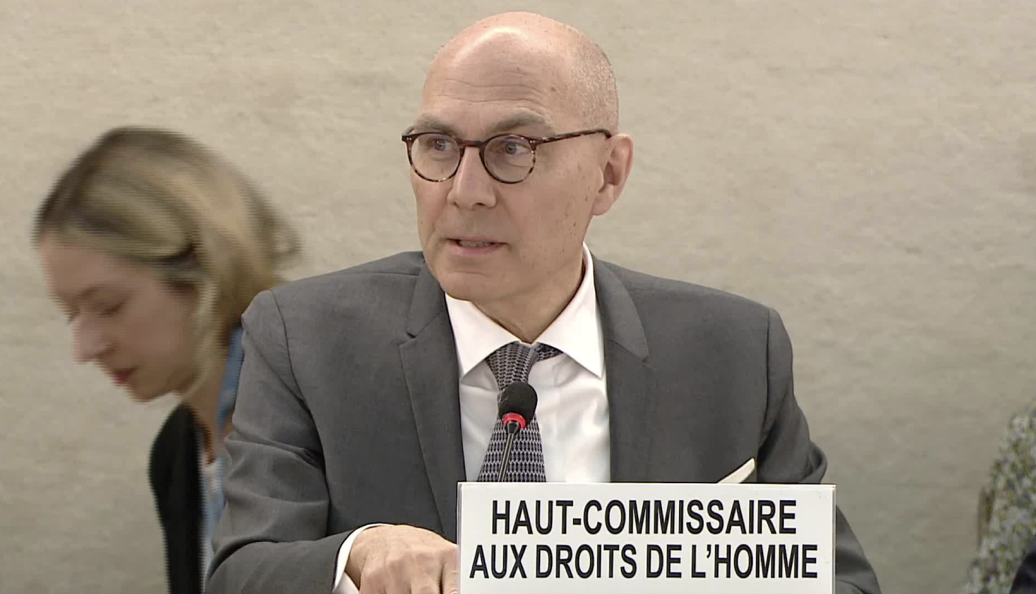On 7 October 2024, Geneva International Centre for Justice, in collaboration with Association Ma’Onah for Human Rights and Immigration, hosted a side-event for the 57th session of the UN Human Rights Council (HRC). The event, on the impact of climate change on human rights in Yemen, addressed the country’s vulnerability to the effects of environmental degradation, and how the violent activities of the Houthi militia have exacerbated it.
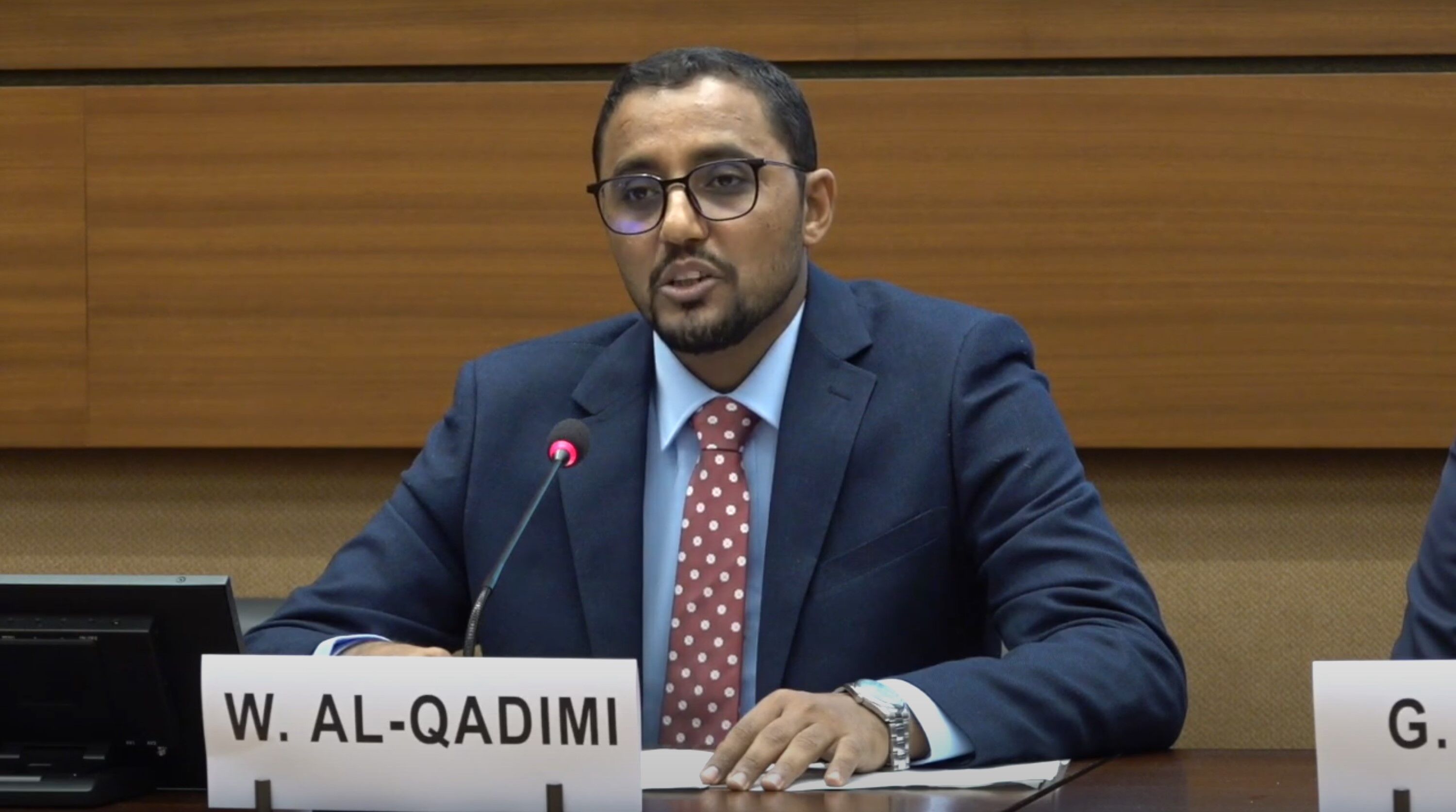 Following an introduction from event moderator Gautier Boyrie, three Yemeni expert speakers shared their remarks on this important subject. The first to present was Mr. Waleed Al-Qudaimi. Mr. Al-Qudaimi is the First Deputy Governor of the Al-Hodeida Governorate, located in western Yemen, and the representative of the local authority at this symposium. He is widely known for his development efforts in relief and reconstruction work in the governorate, which has been severely impacted by recent climate change-related events.
Following an introduction from event moderator Gautier Boyrie, three Yemeni expert speakers shared their remarks on this important subject. The first to present was Mr. Waleed Al-Qudaimi. Mr. Al-Qudaimi is the First Deputy Governor of the Al-Hodeida Governorate, located in western Yemen, and the representative of the local authority at this symposium. He is widely known for his development efforts in relief and reconstruction work in the governorate, which has been severely impacted by recent climate change-related events.
Mr. Al-Qudaimi highlighted the dire humanitarian and environmental crisis affecting millions of Yemenis due to ongoing armed conflict and climate-related disasters. Notably, Yemen has experienced increased flooding and displacement, with nearly 490,000 people forced from their homes in 2024. Climate impacts have been worsened by damaged water and agricultural infrastructure, which heightens the vulnerability of communities and the spread of diseases amid a collapsing health system.
Mr. Al-Qudaimi then turned his attention to the activities of the Houthi militia. He condemned the Houthis for extensive human rights abuses, including the indiscriminate planting of landmines that endanger civilians and devastate the environment and agriculture. Over 463,000 explosives have been removed to date, but many more remain active and dangerous. Additionally, the Houthis have conducted systematic bombings of civilian homes and religious sites, restricted humanitarian access, and used the Hodeida region’s ports for military purposes, thereby threatening regional and international security. This has transformed crucial aid channels into tools of war, significantly hindering relief efforts. In closing, Al-Qudaimi called for urgent international intervention to open humanitarian corridors, facilitate aid delivery, and ensure demining efforts, emphasising that Hodeida’s ports were once vital for Yemen’s economy and are now being exploited to further the Houthis' military agenda.
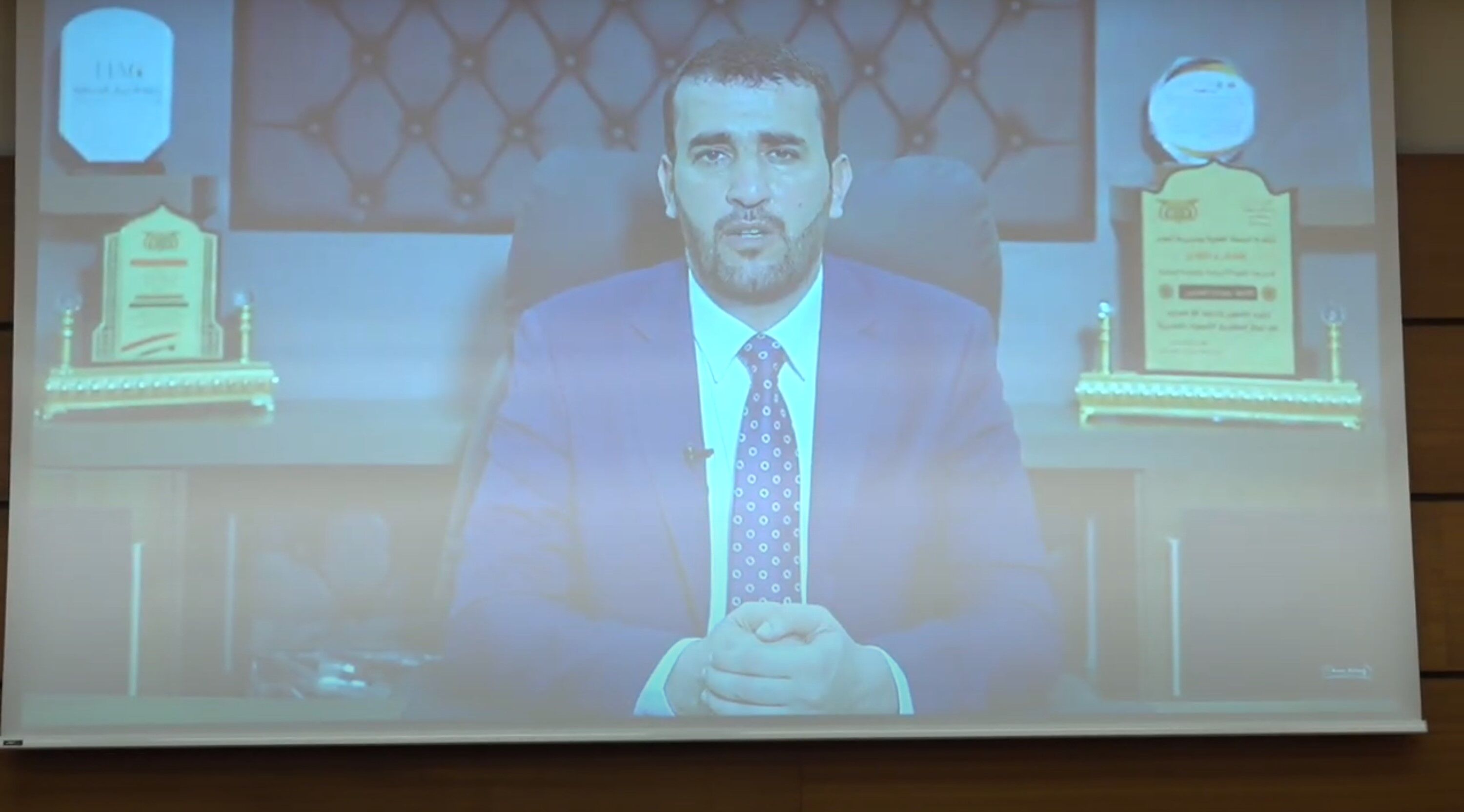 Our second speaker at this event was Mr. Al-Habishi, the Executive Director of the Humanitarian Work Cell Organization in Yemen, the largest humanitarian relief organization operating in western Yemen. He is also a human rights activist and active participant in numerous international, regional, and local conferences focused on defending human rights and promoting sustainable development goals. Unfortunately, Mr. Al-Habishi could not be present at the event, opting to submit a video statement instead.
Our second speaker at this event was Mr. Al-Habishi, the Executive Director of the Humanitarian Work Cell Organization in Yemen, the largest humanitarian relief organization operating in western Yemen. He is also a human rights activist and active participant in numerous international, regional, and local conferences focused on defending human rights and promoting sustainable development goals. Unfortunately, Mr. Al-Habishi could not be present at the event, opting to submit a video statement instead.
Mr. Al-Habishi emphasised the impacts of climate change on Yemen, in particular, its devastating effects on water scarcity, environmental safety and health, malnutrition and the absence of food security, and the ability of Yemeni people to earn livable wages. He further highlighted the impact of heavy rains on thousands of homes in all regions of the country, which have deteriorated to the point of forcing their residents into displacement. The Humanitarian Work Cell has made significant efforts, in collaboration with governing authorities and rescue teams, to support communities as they suffer from these impacts. As environmental degradation worsens, the organisation has been working to harness clean energy sources, including solar panels, to provide displaced people with energy. It has also made efforts to combat desertification and provide access to clean water by planting trees and building water desalination plants along the western coast of Yemen, respectively.
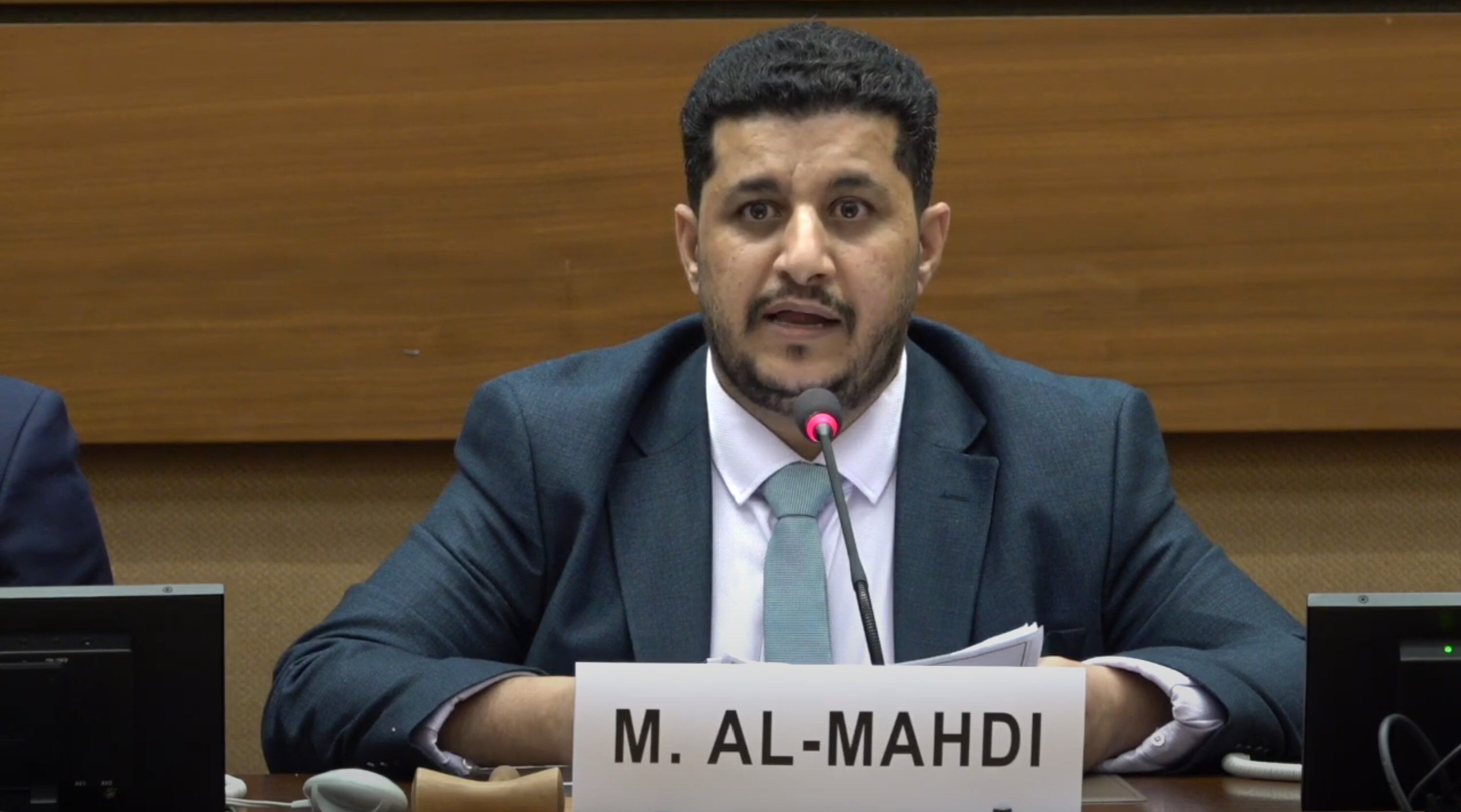 The final speaker to present was Mr. Muhammad Al-Mahdi, a well-known Yemeni journalist and media professional with numerous contributions with international and Arabic satellite TV channels and newspapers. He has participated in a number of conferences on the situation in Yemen. He also works as a volunteer in several Yemeni human rights organisations.
The final speaker to present was Mr. Muhammad Al-Mahdi, a well-known Yemeni journalist and media professional with numerous contributions with international and Arabic satellite TV channels and newspapers. He has participated in a number of conferences on the situation in Yemen. He also works as a volunteer in several Yemeni human rights organisations.
Mr. Al-Mahdi began by discussing Yemen’s environmental and humanitarian crisis, which have been worsened by climate change and the Houthi conflict. He noted that Yemen has faced decades of rising temperatures and water scarcity, which intensified after the Houthi takeover in 2014. Extreme weather events like Cyclone Chapala in 2015 and Cyclone Tej in 2023 led to devastating floods and displacement, and from January to April 2024 alone, over 32,000 people were displaced due to climate-related disasters.
Mr Al-Mahdi proceeded to condemn the Houthi militia for planting millions of landmines, which displaced farmers, contaminated water sources, and resulted in high child casualties. He projected that climate change and the conflict would cost Yemen $93 billion in output by 2060 and could leave 3.8 million people malnourished. He also highlighted the environmental risks from Houthi attacks on tankers in the Red Sea, which have polluted the water, killed marine life, and threatened public health. He stressed that ineffective waste management and the government’s inability to address these crises had worsened pollution, making arable land unfit for cultivation, and disrupting Yemen’s ecological balance.
Question from the audience
After the speakers presented their remarks, we fielded questions and comments from the audience. The first question had to do with the risks posed by landmines throughout the country, and the efforts being made to ensure they do not harm civilians.
Mr. Al-Qudaimi, in response, estimated that the Houthi militia have planted about a million landmines in the Al-Hodeida governorate. Significant resources, included several teams dedicated to searching for and removing them, have made sizeable inroads in addressing the issue, though much work remains. These mines were not planted without planning. They are often camouflaged among trees and stones, and even between the homes of the civilians who were displaced by the terrorist group’s activities. Tragically, families and communities returning home during calmer periods have found their loved ones, including many children, killed or maimed by these explosives. As Mr. Al-Qudaimi somberly notes, the issue of landmines can only be fully resolved once the Houthi militia and their affiliates are expelled from the country, unable to terrorise the local population anymore.
The second audience question concerned the steps the international community needs to take to resolve the conflict in Yemen, recapture the territories seized by the Houthi forces, and ensure lasting peace in the country. Given the violence and chaos we see today, what can be done to put an end to this years-long struggle?
The answer to this challenging problem, according to Mr. Al-Qudaimi, is to increase international pressure on those who support the Houthi’s operations, in particular Iran. The international community must do more to support and recognise the legitimate government of Yemen. The fact that the sovereignty of the Yemeni people has been ignored for so many years in favour of violent, foreign-backed terrorists, is unacceptable and must be corrected. And as Mr. Al-Mahdi further emphasised, seeing that the Houthis have repeatedly violated international law while receiving the financial support and technical guidance of Iran, it is the responsibility of the international community to denounce the country’s involvement and impose diplomatic measures that would force them into backing from the conflict. Until then, the terrible havoc the Houthis have wrecked upon Yemen’s infrastructure, as well as its social and political life, will go unchecked.
Geneva International Centre for Justice (GICJ) is resolute in its call for justice for the Yemeni people. Climate change poses an immediate and substantial threat to communities throughout the country, who have been displaced in the thousands, and forced into starvation, poverty and instability as a result of its effects. Yemen ranks third among countries most vulnerable to climate change and least prepared for climate shocks, according to international observers. It is imperative that the international community make concerted efforts to alleviate their struggles, first by recognising and supporting the legitimate government of Yemen.
As the speakers have powerfully shown, such efforts require that the atrocities of the Houthi militia be put to an end. The terrorist group has repeatedly committed grave violations of international law and international humanitarian law. These violations, as we now see, have direct implications for the degradation of Yemen’s environment, from oil spills and hazardous chemical leakages to the destruction of key infrastructure such as water treatment plants and fuel storage facilities. This behaviour cannot be allowed to persist. We urgently call on the international community to impose sanctions on those responsible for supporting the Houthi terrorists, and to provide humanitarian support to those affected.







